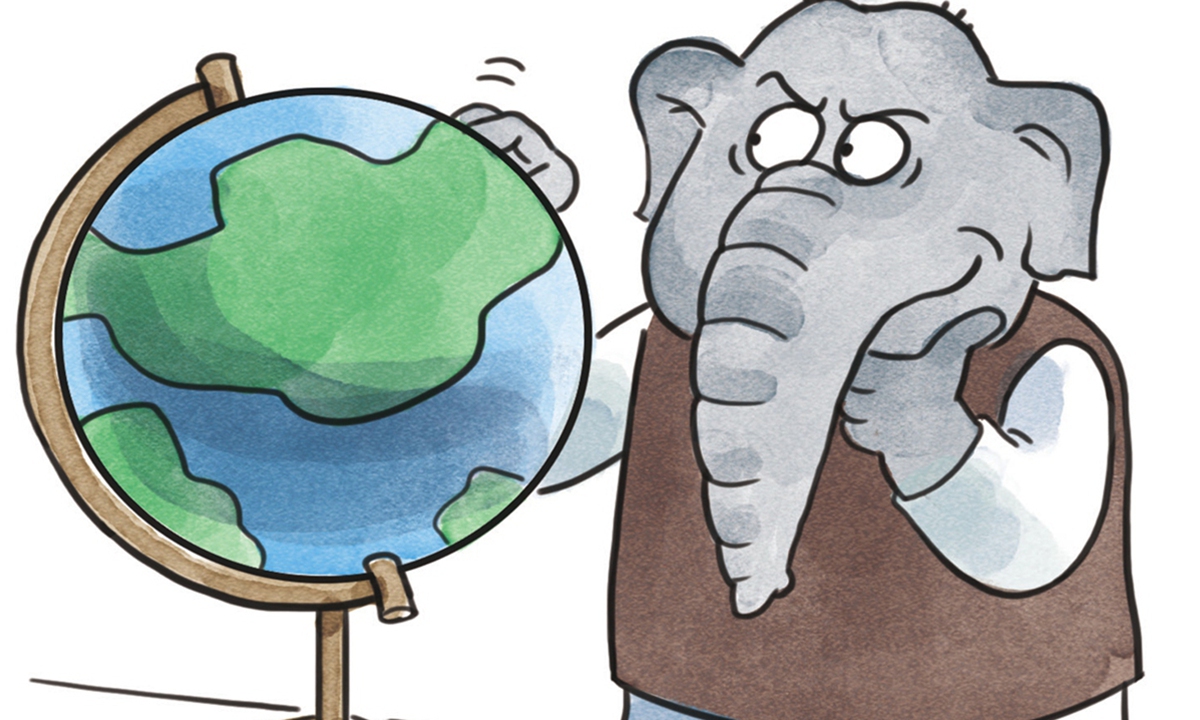
India Illustration: Liu Rui/GT
Indian Prime Minister Narendra Modi announced on his social media account on Monday that his country successfully conducted "the first flight test of indigenously developed Agni-5 missile with Multiple Independently Targetable Re-entry Vehicle (MIRV) technology."
Indian media reported that the deployment of MIRV technology can enhance India's first-strike proficiency for strategic forces. India's Minister of Defense Rajnath Singh said on X that India had "joined the select group of nations" capable of utilizing this missile technology, referring to the US, UK, France, China and Russia which have already used MIRV missiles.
Indian and Western media rushed to hype that India's move is aimed at increasing nuclear deterrence against "rivals" China and Pakistan, and that it will make China "nervous" and "have no edge" over India.
Whenever India makes military progress, public opinion in India and some major Western countries, which are keen on fanning hostilities between the two Asian powers, immediately hypes that it will make China and Pakistan feel afraid. It is as if the newly added deterrent should be quickly used in India's relations with China and Pakistan. This idea is naive and dangerous.
The attitude of China actively developing friendly relations with India is sincere. And truth be told, China is not very concerned about the improvement of India's military capabilities because this improvement does not constitute a trend of India's military power surpassing China. Liu Zongyi, director of the Center for South Asia Studies at the Shanghai Institutes for International Studies, told the Global Times that there are still huge gaps, even generational gaps, between India and other major powers such as the US, China and Russia in terms of missile capabilities.
Liu noted that the Indian media's reference of the latest development to China can be seen as India currying favor from the West in its competition with China.
A reality we have to face is that India is continuing strengthening its military capabilities. A Beijing-based military expert told the Global Times that India's ballistic missile technology has become mature, as India is able to launch several satellites in one rocket, which lays the foundation for India to develop MIRV technology, a capability that should not be overlooked.
India, which has been engaged in military adventurism, has always been eyeing to become a global military powers. It is well aware that it must enhance its strategic nuclear capabilities in order to achieve this goal, not to mention that India has long sought a permanent seat on the UN Security Council.
But India's move may trigger tensions in the region and beyond. As a result, it is not difficult to see the threat it poses to neighboring countries. If India adopts peace-centered foreign policies, the South Asian region will be peaceful. But, if it doesn't, the region will be dragged into conflicts. India should give up its mind-set of military adventurism and invest more in people's livelihoods.
India has been developing and testing its Agni series of missiles for more than a decade in a bid to catch up with China's military strength. India wants to make progress, not only in its ballistic missile weapons, but also in aerospace technologies, as both ballistic missiles and space flights require modern aerospace technologies. That is why in recent years India has been making advances in aerospace and even planning to launch the first manned space flight this year.
The successful first flight test of Agni-5 missile has already bolstered India's wild ambitions. In an interview with Indian news agency ANI, former vice chief of the Air Staff Air Marshal Shirish Baban Deo (Retd) said it sends a clear message that the country is now prepared for everything. "Leave us alone, don't trouble us and if you trouble us, trouble will find you that you can't handle."
We hope India maintains its strategic sobriety amid pride and arrogance brought about by its latest military achievements.
The author is an editor with the Global Times. wangwenwen@globaltimes.com.cn




